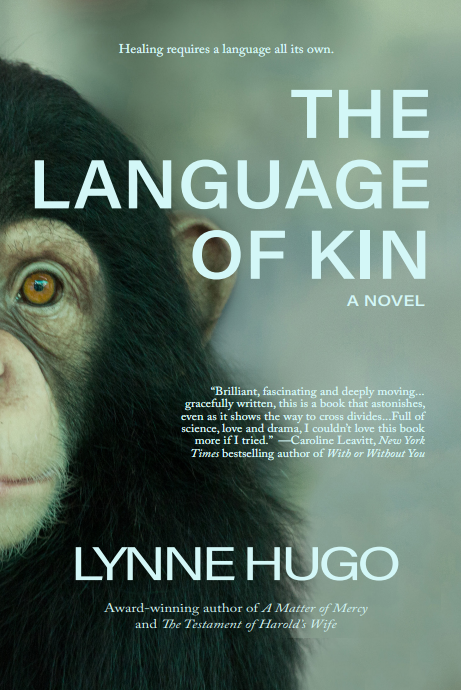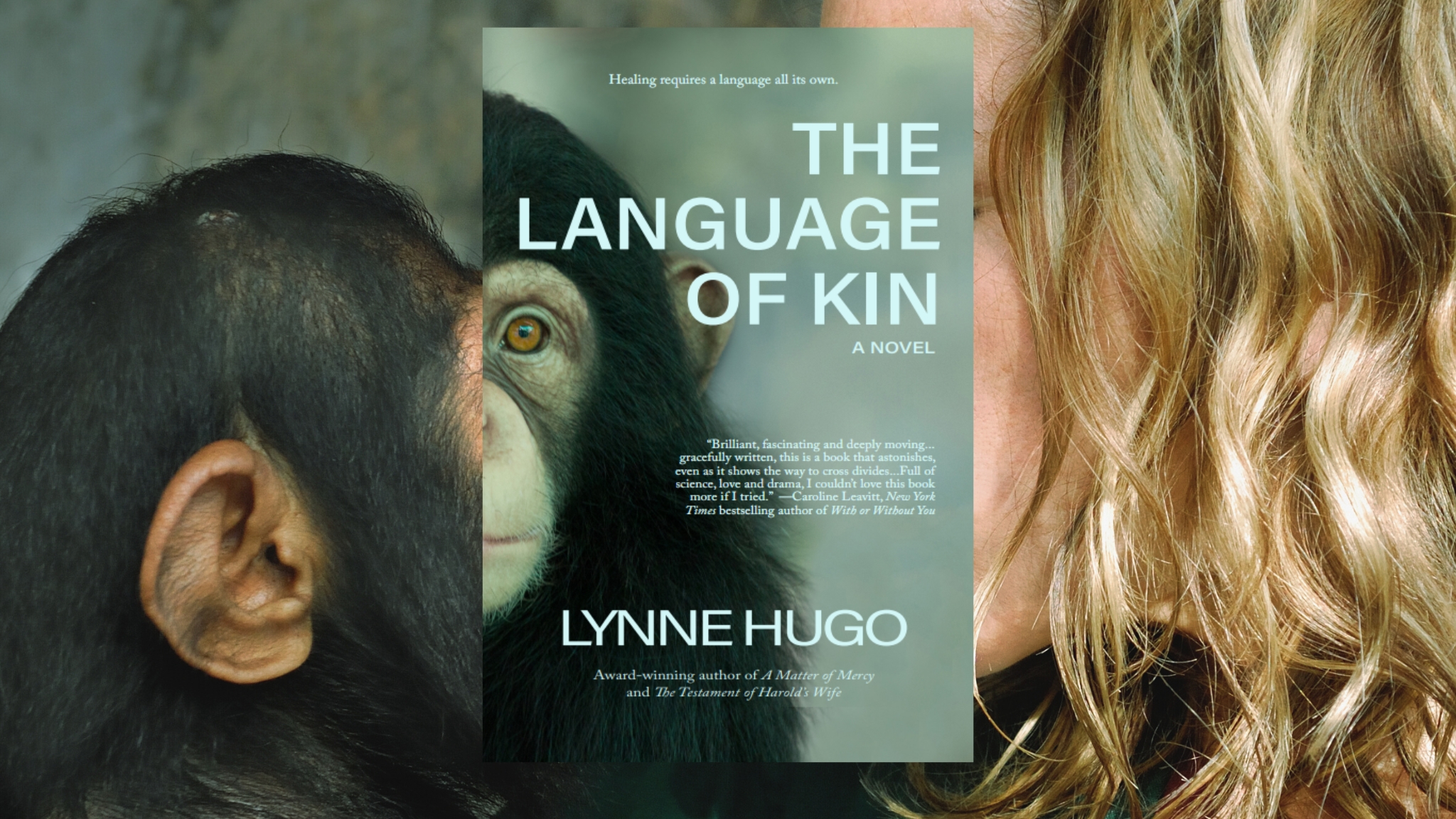The Language of Kin by Lynne Hugo
In western Uganda, a young chimpanzee cowers in fear as she witnesses poachers shoot and kill every mother in a group of chimps nursing their young — including her own mother. Eve, the terrified chimp, along with several other baby chimps, is carried away. While her companions are sent to domestic life and dressed in diapers, or forced to do tricks in a circus, Eve is sent to a laboratory.
Eight years later, after innumerable bouts of testing, prodding, injections and surgeries, she is sent to a zoo, where she will be rehabilitated and nursed back to health before being integrated with other members of her species. Eve’s keepers must compromise on their values and learn how to put the chimp’s needs before their own if she is going to have any chance of recovery. The Language of Kin (Amphorae Publishing) by Lynne Hugo is a beautifully crafted story about what it means to care for others beyond barriers to communication and understanding.
Fighting to Care for a Traumatized Chimp
Kate McKinsey is a compassionate but determined keeper at the zoo, in charge of designing and building new habitats for the primates. Marco Lopez, softhearted and unconventional in his approaches to the animals, is tasked with caring for Eve. But Marc and Kate have different morals; while Kate opposes zoos and captivity of any kind for their inability to replicate nature, Marc asserts that zoos are the only fighting chance for endangered species.
When Eve arrives at the zoo, malnourished, scarred and traumatized from her time in the lab, she is placed in a habitat smaller than Marc and Kate had hoped for her. But limited time and resources required them to make the most of the situation, and be sure Eve receives the best care they can offer.
With short chapters from the perspective of Eve, we see her jolted thought process as she begins to move past fear and hesitation to understand the world around her and her caregivers’ good intentions. When a poorly timed disaster strikes, Marc and Kate have to put their differences — and budding romance — aside in favor of their work and the new chimp they have grown to love.
Caretaking and Language Barriers
At the same time that Eve is adjusting to her new life, Kate’s mother, Dorothy, deals with a similar transition. Having lost the ability to understand words, due to progressive primary aphasia, the retirement community Dorothy belongs to doesn’t have the bandwidth to care for her. So, she must move to a nursing home with more hands-on care — a major change that Kate isn’t even able to communicate to her.
Kate feels overwhelmed and alone until Marc shares something she never expected — he too, has to care for his own mother, who is deaf and is agoraphobic. With one mother that can’t speak, one that can’t hear, and the task of caring for a chimp with no way to communicate with or understand her caretakers, Marc and Kate must figure out a way to navigate life’s obstacles and bring their families together — beyond the confines of language.
Hugo cleverly parallels the efforts to communicate with Kate’s mother, Marc’s efforts to get his mother Honoria out of the house, and the keepers’ attempts to build trust with Eve. Both Dorothy and Eve are caged, carried to foreign places with no way to understand or express their needs. And Honoria is trapped by fear, in a hearing world without access to the Deaf community. But Marc and Kate are gentle and determined caretakers of the ones they love, even when they have a difference of opinion. Wanting the best for their mothers, their chimps, and each other proves to be the uniting force in achieving even the most impossible goals.
Beautifully Written Tale of Compassion
The Language of Kin is at once a captivating story of interspecies connection while detailing a heartbreaking account of animal abuse and neglect. But it is also about human connection, and the barriers that language has in letting us truly say what we mean. How could words ever be enough for Marc to tell Kate how he feels? Without language, how can Kate reassure her mother that she will do everything she can to fight for her right to communication? How can Marc convince his mother that the world beyond her safe domain is worth exploring?
Lynne Hugo tackles a vast scope of the world in her novel with environmental issues, poaching, greed, endangered species, the human-animal divide, and language. She presents a series of moral quandaries to the caretakers who are trying their best to do what is right, however “right” might look for them. And Hugo proves it is not the method or the mistakes that matter, but the care and love that propel these characters to action.
Hugo also puts the experience of motherhood on full display. Chimps taking care of other chimps, children taking care of their parents, the pull of love and the push for freedom that comes with being a caretaker for someone dependent on you. The story is bittersweet, at times, with hopeful and triumphant moments scattered across the pages, propelling the reader forward. Above all, The Language of Kin is a beautifully written and poignant tale of compassion and love for the people and creatures that surround us.
About Lynne Hugo:
 Lynne is a National Endowment for the Arts Fellowship recipient who has also received repeat grants from the Ohio Arts Council and the Kentucky Foundation for Women. The Language of Kin is her tenth novel and thirteenth book. Her memoir, Where The Trail Grows Faint, won the Riverteeth Literary Nonfiction Book Prize and her novel, A Matter of Mercy, received the 2015 Independent Publishers Silver Medal for Best North-East Fiction. Another novel (Swimming Lessons) became a Lifetime Original Movie of the Month. More recently, The Testament of Harold’s Wife was a Buzz Books Fall/Winter 2018 selection. Through the Ohio Arts Council’s renowned Arts in Education program, Lynne has taught creative writing to hundreds of schoolchildren.
Lynne is a National Endowment for the Arts Fellowship recipient who has also received repeat grants from the Ohio Arts Council and the Kentucky Foundation for Women. The Language of Kin is her tenth novel and thirteenth book. Her memoir, Where The Trail Grows Faint, won the Riverteeth Literary Nonfiction Book Prize and her novel, A Matter of Mercy, received the 2015 Independent Publishers Silver Medal for Best North-East Fiction. Another novel (Swimming Lessons) became a Lifetime Original Movie of the Month. More recently, The Testament of Harold’s Wife was a Buzz Books Fall/Winter 2018 selection. Through the Ohio Arts Council’s renowned Arts in Education program, Lynne has taught creative writing to hundreds of schoolchildren.
Born and educated in New England, Lynne and her photographer husband live in Ohio. They are grateful parents of two, have three grandchildren and large, rowdy extended families. She hikes with her husband and their yellow Lab, Scout, Terror Of All Squirrels, who excels at playing shortstop, barking, and rolling in anything stinky on the hiking trails.






